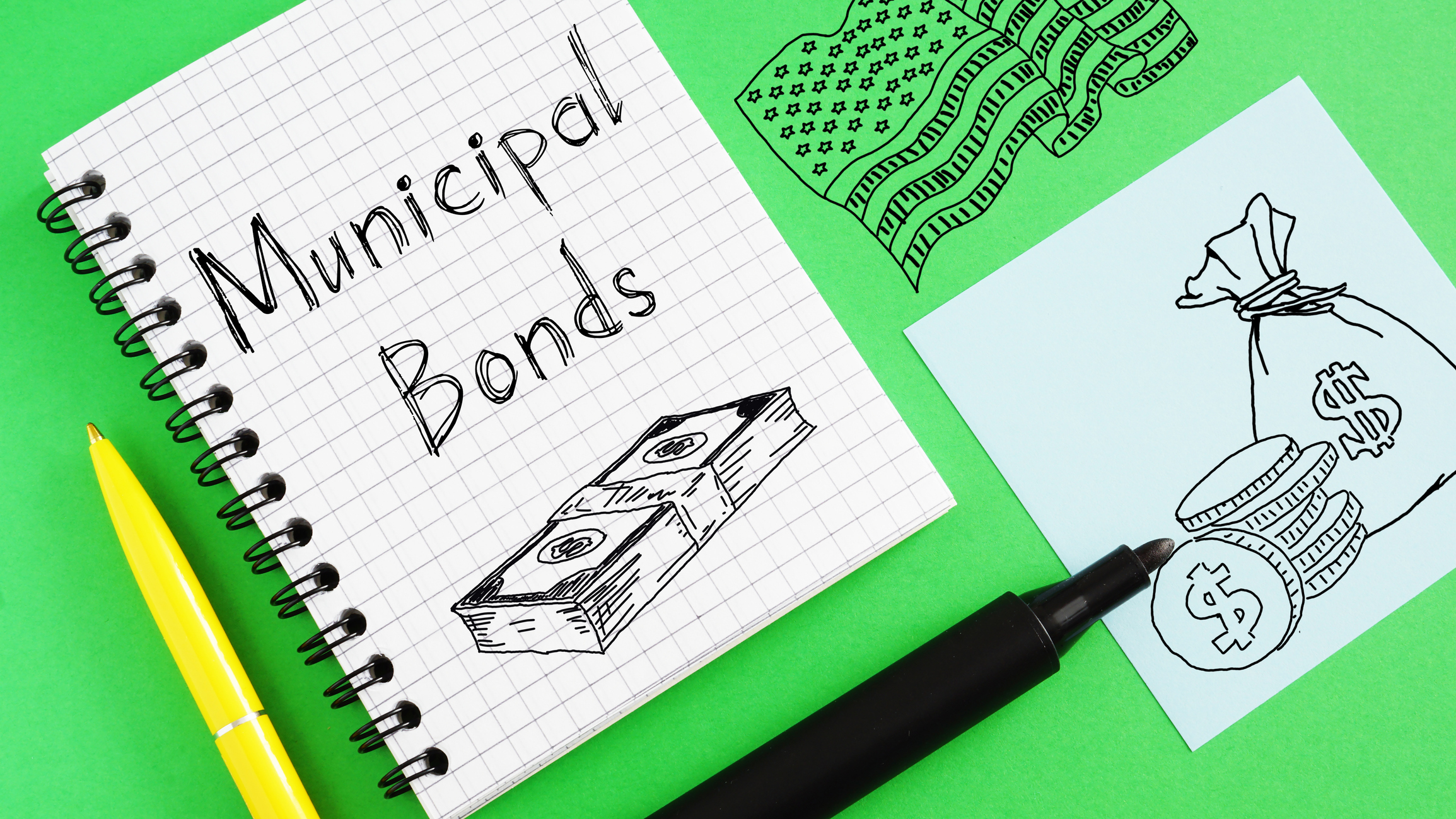Keep Tax Collectors at Bay with Muni Bond Funds
Municipal bonds can be good insurance against inflation — and interest is tax-free. But as with all investments, understanding risk is key.


Profit and prosper with the best of Kiplinger's advice on investing, taxes, retirement, personal finance and much more. Delivered daily. Enter your email in the box and click Sign Me Up.
You are now subscribed
Your newsletter sign-up was successful
Want to add more newsletters?

Delivered daily
Kiplinger Today
Profit and prosper with the best of Kiplinger's advice on investing, taxes, retirement, personal finance and much more delivered daily. Smart money moves start here.

Sent five days a week
Kiplinger A Step Ahead
Get practical help to make better financial decisions in your everyday life, from spending to savings on top deals.

Delivered daily
Kiplinger Closing Bell
Get today's biggest financial and investing headlines delivered to your inbox every day the U.S. stock market is open.

Sent twice a week
Kiplinger Adviser Intel
Financial pros across the country share best practices and fresh tactics to preserve and grow your wealth.

Delivered weekly
Kiplinger Tax Tips
Trim your federal and state tax bills with practical tax-planning and tax-cutting strategies.

Sent twice a week
Kiplinger Retirement Tips
Your twice-a-week guide to planning and enjoying a financially secure and richly rewarding retirement

Sent bimonthly.
Kiplinger Adviser Angle
Insights for advisers, wealth managers and other financial professionals.

Sent twice a week
Kiplinger Investing Weekly
Your twice-a-week roundup of promising stocks, funds, companies and industries you should consider, ones you should avoid, and why.

Sent weekly for six weeks
Kiplinger Invest for Retirement
Your step-by-step six-part series on how to invest for retirement, from devising a successful strategy to exactly which investments to choose.
Prices and other data are as of May, 2025.
You’ve got some money in bond funds. You did some shopping, and your fund is throwing off more than 4% in interest. Pretty good, considering inflation ran at 2.4% the past 12 months.
Now you talk to your accountant, who reminds you that you’re in the 32% tax bracket. Oops. Your 4% yield is now 2.7%. Back out inflation and you’re earning just 0.3%. On a $10,000 investment, that’s a return after taxes and inflation of $30. Take your best friend to dinner at McDonald’s.
You can’t do much about inflation, but you can do something about taxes — with municipal bonds. “For years, the only reason to own bonds was diversification,” says Jim Murphy, lead portfolio manager for municipal bonds at T. Rowe Price. But now, they’re good inflation insurance. Some high-yield municipal bond funds and ETFs yield 5% or more. If you’re in the 32% tax bracket, you’d need your taxable fund to yield 7.4% to get the same return after taxes.
From just $107.88 $24.99 for Kiplinger Personal Finance
Become a smarter, better informed investor. Subscribe from just $107.88 $24.99, plus get up to 4 Special Issues

Sign up for Kiplinger’s Free Newsletters
Profit and prosper with the best of expert advice on investing, taxes, retirement, personal finance and more - straight to your e-mail.
Profit and prosper with the best of expert advice - straight to your e-mail.
Pretty tasty, right? Just remember that your high muni yield comes with a side order of risk.
Muni bonds: The risks
Muni bonds are issued by states, cities and municipal organizations, and their interest is exempt from federal income taxes. If you own a muni bond issued by your state, interest is free from federal, state and local taxes.
The main risk from any high-yield bond is that the issuer defaults and can’t pay interest or repay the principal at maturity. High-yield muni funds pick from bonds on the lower end of credit ratings, which means they're rated lower than Baa (by Moody's) or BBB (by S&P and Fitch). Municipal defaults are rare — about 0.8% since 1970, according to Fidelity Investments. Current bankruptcy law doesn’t allow states to go bankrupt, although cities and other municipal issuers can.
But the price of a muni bond can go down if buyers begin to doubt the issuer's solvency — for example, if companies such as Moody’s downgrade their credit rating. Because just 5% of the total municipal bond market is considered high yield, price drops can be rapid.
Puerto Rico’s bonds were a classic example of what can go wrong. The bonds were highly popular with muni funds because interest from them is tax-exempt in every state. In 2015, prices on Puerto Rico’s bonds fell about 12%, to 68.5 cents on the dollar, on the day the island’s governor declared the debt “not payable.”
All bonds face interest rate risk. Bond prices fall when interest rates rise, and vice versa. If you own an individual bond and hold it to maturity, you don’t have to worry about rising or falling rates. If you own bonds through a fund or ETF, however, you can lose money when rates rise. (Conversely, you can gain if you sell after rates fall).
A muni fund manager has two ways to increase a fund’s yield. She can buy bonds with long maturities, or she can buy bonds with a higher default rate; both strategies tend to make the fund riskier. For example, iShares High Yield Muni Active ETF (HIMU) currently yields just over 5%. The fund sometimes holds as much as half of its portfolio in unrated bonds, according to Morningstar, and it tends to buy longer-term bonds than its peers. Capital Group Municipal High-Income ETF (CGHM) tends to buy shorter-term, higher-quality bonds. Its current yield is just under 4.5%.
If you want to see how munis fare in a rising rate environment, look at how they performed in 2022, when rates rose sharply. The Vanguard Total Bond Market ETF (BND) fell 13%. IShares National Muni Bond ETF (MUB), the largest muni bond ETF, fell over 7%, while First Trust Municipal High Income (FMHI), the largest high-yield muni bond ETF, fell almost 15%.
Municipal bonds: What to buy
Stay away from high-yield munis with high expense ratios. Every dollar you give to your fund company is one you won’t have when you need it.
Two muni ETFs that have expenses below 0.5% and yields above 4%: iShares High Yield Muni Active ETF (HIMU) and SPDR Nuveen Bloomberg High Yield Municipal Bond ETF (HYMB). Two garden-variety mutual funds that fit the bill: Eaton Vance High Yield Municipal (EWHYX) and T. Rowe Price Intermediate Term High Yield (PRIHX).
Typically, the best time to buy muni funds is when the yield of a 10-year high-grade muni bond is about 85% of that of a Treasury security with a similar term. By that measure, munis are as cheap as they have been since the economic recovery began in 2022, according to Nuveen.
Note: This item first appeared in Kiplinger Retirement Report, our popular monthly periodical that covers key concerns of affluent older Americans who are retired or preparing for retirement. Subscribe for retirement advice that’s right on the money.
Related content
Profit and prosper with the best of Kiplinger's advice on investing, taxes, retirement, personal finance and much more. Delivered daily. Enter your email in the box and click Sign Me Up.

-
 Quiz: Do You Know How to Avoid the "Medigap Trap?"
Quiz: Do You Know How to Avoid the "Medigap Trap?"Quiz Test your basic knowledge of the "Medigap Trap" in our quick quiz.
-
 5 Top Tax-Efficient Mutual Funds for Smarter Investing
5 Top Tax-Efficient Mutual Funds for Smarter InvestingMutual funds are many things, but "tax-friendly" usually isn't one of them. These are the exceptions.
-
 AI Sparks Existential Crisis for Software Stocks
AI Sparks Existential Crisis for Software StocksThe Kiplinger Letter Fears that SaaS subscription software could be rendered obsolete by artificial intelligence make investors jittery.
-
 Quiz: Do You Know How to Avoid the 'Medigap Trap?'
Quiz: Do You Know How to Avoid the 'Medigap Trap?'Quiz Test your basic knowledge of the "Medigap Trap" in our quick quiz.
-
 5 Top Tax-Efficient Mutual Funds for Smarter Investing
5 Top Tax-Efficient Mutual Funds for Smarter InvestingMutual funds are many things, but "tax-friendly" usually isn't one of them. These are the exceptions.
-
 Why Invest In Mutual Funds When ETFs Exist?
Why Invest In Mutual Funds When ETFs Exist?Exchange-traded funds are cheaper, more tax-efficient and more flexible. But don't put mutual funds out to pasture quite yet.
-
 We Retired at 62 With $6.1 Million. My Wife Wants to Make Large Donations, but I Want to Travel and Buy a Lake House.
We Retired at 62 With $6.1 Million. My Wife Wants to Make Large Donations, but I Want to Travel and Buy a Lake House.We are 62 and finally retired after decades of hard work. I see the lakehouse as an investment in our happiness.
-
 Social Security Break-Even Math Is Helpful, But Don't Let It Dictate When You'll File
Social Security Break-Even Math Is Helpful, But Don't Let It Dictate When You'll FileYour Social Security break-even age tells you how long you'd need to live for delaying to pay off, but shouldn't be the sole basis for deciding when to claim.
-
 I'm an Opportunity Zone Pro: This Is How to Deliver Roth-Like Tax-Free Growth (Without Contribution Limits)
I'm an Opportunity Zone Pro: This Is How to Deliver Roth-Like Tax-Free Growth (Without Contribution Limits)Investors who combine Roth IRAs, the gold standard of tax-free savings, with qualified opportunity funds could enjoy decades of tax-free growth.
-
 One of the Most Powerful Wealth-Building Moves a Woman Can Make: A Midcareer Pivot
One of the Most Powerful Wealth-Building Moves a Woman Can Make: A Midcareer PivotIf it feels like you can't sustain what you're doing for the next 20 years, it's time for an honest look at what's draining you and what energizes you.
-
 Stocks Make More Big Up and Down Moves: Stock Market Today
Stocks Make More Big Up and Down Moves: Stock Market TodayThe impact of revolutionary technology has replaced world-changing trade policy as the major variable for markets, with mixed results for sectors and stocks.